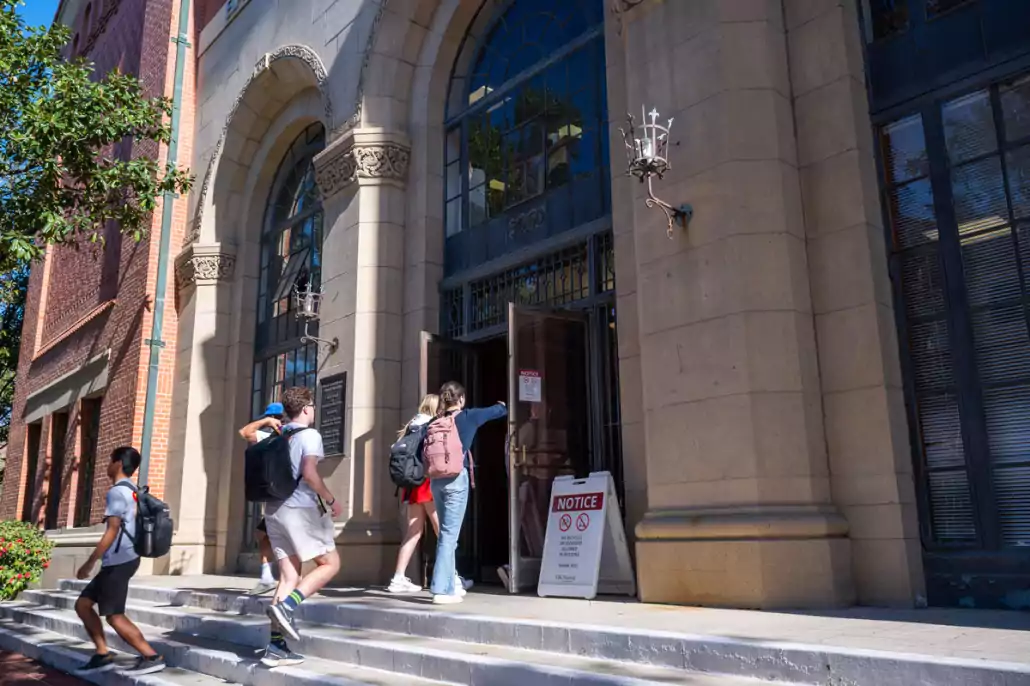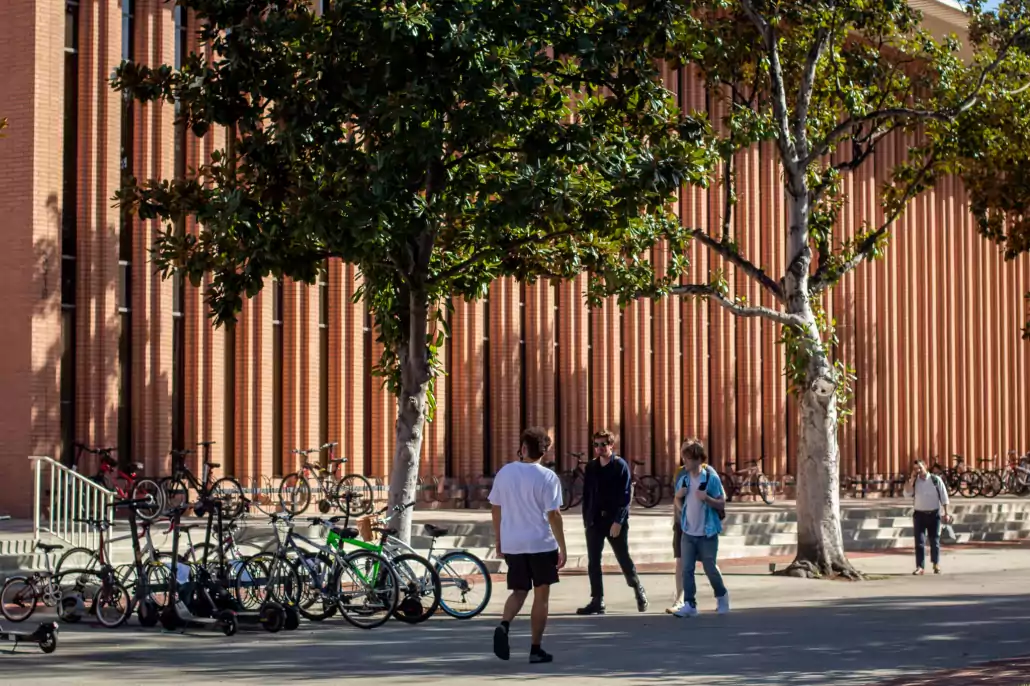‘TW: sensitive content’
Some students and faculty say they support adding trigger warnings to course syllabi.
Some students and faculty say they support adding trigger warnings to course syllabi.

Students at USC may find a warning in their syllabus, or they may be provided a verbal warning before interacting with certain materials. These warnings — often known as trigger warnings — are intended to notify students about upsetting content in their class materials.
Katie Simons, a sophomore majoring in journalism, said a warning preceding sensitive content would be beneficial.
“I’m taking a GE about dance and feminine sexuality but one of the things we looked at was … [instances of rape] and marital rape law [in India],” Simons said. “My professor, right before she started the video about it, was like ‘Oh, by the way, trigger warning. Look away if you want to.’ It would be a lot more beneficial to let people know ahead of time.”
Earlier this year, the undergraduate student assembly at Cornell University unanimously voted in favor of a resolution urging professors to include content warnings on their syllabi. These content warnings were for courses that included “traumatic content.”
The administration responded promptly, vetoing the resolution for infringing on “academic freedom and freedom of inquiry.” This instance reflects one of many debates sparked on campuses across the country, as college students increasingly request “trigger warnings” for sensitive topics.
Jelila Adedoyin Surakat, a sophomore majoring in cinema and media studies, said she does not believe trigger warnings inhibit freedom of speech.
“I don’t think a trigger warning is limiting what you can say, it’s just putting out there that ‘Hey, these conversations will be had.’”
Sally Pratt, department chair of political science and international relations and a professor of Slavic languages and literatures, said she provides content warnings for her students.
“I feel like I owe it to my students to say ‘some of the works in this class’ — and I say this in the syllabus — ‘that you might deal with things that might make you uncomfortable,’” she said. “It’s sort of a general warning, trigger warning, so that nobody goes in — I don’t want my students to be blindsided.”
Richard McLaughlin, a postdoctoral fellow of the Dornsife College of Letters, Arts and Sciences, who teaches “Fictions of Africa,” a class that features difficult topics surrounding colonialism, said the purpose of content warnings is to provide students with agency when presented with difficult material.
“If a student has experienced trauma connected to a representation they’re going to find in a text, you’re basically giving them a heads up so they can be aware and act accordingly,” McLaughlin said. “Hopefully, giving [students] the information that this is something [that might upset them] gives them the tools that they need to feel comfortable in class.”

Despite the support for trigger warnings, a study published in 2019 by the Association for Psychological Science suggested the practice of issuing trigger warnings had no effect on the participants’ negative feelings towards difficult content.
Trigger warnings are effective for avoiding short-term anxiety, but this avoidance can exacerbate these feelings of anxiety in the future, wrote Bonnie Zucker in a Psychology Today article. Zucker, a psychologist who holds a doctorate in clinical psychology, wrote that leaving a situation when faced with traumatic content can “reinforce the notion that they cannot tolerate the content.”
Lenna Ahmed, a junior majoring in international relations and the global economy, said her professors typically provide warnings before class to make students aware of sensitive content.
“Sometimes when it’s not in the syllabus it’s brought up later in the semester,” she said. “I definitely think there is a responsibility [to provide trigger warnings] given that they pretty much run the classroom and students are there, in part, to learn.”
Ahmed also said certain content can impact students’ learning environment.
“Having sensitive content can really affect the students,” Ahmed said. “And so, to create a safe environment, a productive environment for learning, I do think it’s really important that professors outline all the potential sensitive topics that are going to be discussed in class.”
We are the only independent newspaper here at USC, run at every level by students. That means we aren’t tied down by any other interests but those of readers like you: the students, faculty, staff and South Central residents that together make up the USC community.
Independence is a double-edged sword: We have a unique lens into the University’s actions and policies, and can hold powerful figures accountable when others cannot. But that also means our budget is severely limited. We’re already spread thin as we compensate the writers, photographers, artists, designers and editors whose incredible work you see in our daily paper; as we work to revamp and expand our digital presence, we now have additional staff making podcasts, videos, webpages, our first ever magazine and social media content, who are at risk of being unable to receive the support they deserve.
We are therefore indebted to readers like you, who, by supporting us, help keep our paper daily (we are the only remaining college paper on the West Coast that prints every single weekday), independent, free and widely accessible.
Please consider supporting us. Even $1 goes a long way in supporting our work; if you are able, you can also support us with monthly, or even annual, donations. Thank you.
This site uses cookies. By continuing to browse the site, you are agreeing to our use of cookies.
Accept settingsDo Not AcceptWe may request cookies to be set on your device. We use cookies to let us know when you visit our websites, how you interact with us, to enrich your user experience, and to customize your relationship with our website.
Click on the different category headings to find out more. You can also change some of your preferences. Note that blocking some types of cookies may impact your experience on our websites and the services we are able to offer.
These cookies are strictly necessary to provide you with services available through our website and to use some of its features.
Because these cookies are strictly necessary to deliver the website, refusing them will have impact how our site functions. You always can block or delete cookies by changing your browser settings and force blocking all cookies on this website. But this will always prompt you to accept/refuse cookies when revisiting our site.
We fully respect if you want to refuse cookies but to avoid asking you again and again kindly allow us to store a cookie for that. You are free to opt out any time or opt in for other cookies to get a better experience. If you refuse cookies we will remove all set cookies in our domain.
We provide you with a list of stored cookies on your computer in our domain so you can check what we stored. Due to security reasons we are not able to show or modify cookies from other domains. You can check these in your browser security settings.
These cookies collect information that is used either in aggregate form to help us understand how our website is being used or how effective our marketing campaigns are, or to help us customize our website and application for you in order to enhance your experience.
If you do not want that we track your visit to our site you can disable tracking in your browser here:
We also use different external services like Google Webfonts, Google Maps, and external Video providers. Since these providers may collect personal data like your IP address we allow you to block them here. Please be aware that this might heavily reduce the functionality and appearance of our site. Changes will take effect once you reload the page.
Google Webfont Settings:
Google Map Settings:
Google reCaptcha Settings:
Vimeo and Youtube video embeds:
The following cookies are also needed - You can choose if you want to allow them:
